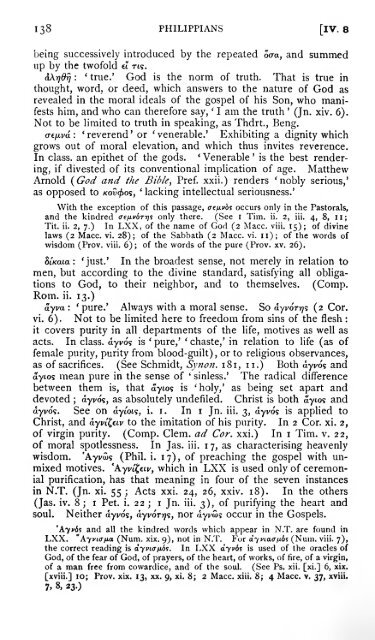Philippians and Philemon - MR Vincent - 1906.pdf
Philippians and Philemon - MR Vincent - 1906.pdf
Philippians and Philemon - MR Vincent - 1906.pdf
Create successful ePaper yourself
Turn your PDF publications into a flip-book with our unique Google optimized e-Paper software.
138 PHILIPPIANS [IV. 8<br />
being successively introduced by the<br />
up by the twofold el .<br />
repeated , <strong>and</strong> summed<br />
:<br />
' true.' God is the norm of truth. That is true in<br />
thought, word, or deed, which answers to the nature of God as<br />
revealed in the moral ideals of the gospel of his Son, who mani-<br />
fests him, <strong>and</strong> who can therefore say, ' I am the truth '<br />
(Jn. xiv. 6).<br />
Not to be limited to truth in speaking, as Thdrt., Beng.<br />
:<br />
' reverend ' or * venerable.' Exhibiting a dignity which<br />
grows out of moral elevation, <strong>and</strong> which thus invites reverence.<br />
In class, an epithet of the gods. * Venerable ' is the best rendering,<br />
if divested of its conventional implication of age. Matthew<br />
Arnold (God <strong>and</strong> the Bible, Pref. xxii.) renders 'nobly serious,'<br />
as opposed to,' lacking intellectual seriousness.'<br />
With the exception of this passage, occurs only in the Pastorals,<br />
<strong>and</strong> the kindred;only there. (See i Tim. ii. 2, iii.<br />
Tit. ii. 2, 7.) In LXX, of the name of God (2 Mace. viii. 15);<br />
4, 8, 1 1<br />
of divine<br />
laws (2 Mace. vi. 28); of the Sabbath (2 Mace. vi. 11); of the words of<br />
wisdom (Prov. viii. 6); of the words of the pure (Prov. xv. 26).<br />
:<br />
* just.' In the broadest sense, not merely in relation to<br />
men, but according to the divine st<strong>and</strong>ard, satisfying all obligations<br />
to God, to their neighbor, <strong>and</strong> to themselves. (Comp.<br />
Rom. ii. 13.)<br />
:<br />
* pure.' Always with a moral sense. So (2 Cor.<br />
vi. 6). Not to be limited here to freedom from sins of the flesh<br />
it covers purity in all departments of the life, motives as well as<br />
acts. In class,? is ' pure,' * chaste,' in relation to life (as of<br />
female purity, purity from blood-guilt) , or to religious observances,<br />
as of sacrifices. (See Schmidt, Synon. 181, 11.) Both?<strong>and</strong><br />
mean pure in the sense of * sinless,' The radical difference<br />
between them is, that is 'holy,' as being set apart <strong>and</strong><br />
. , devoted ,as ; absolutely undefiled. Christ is both <strong>and</strong><br />
See on i. I. In I Jn. iii. 3, is applied to<br />
Christ, <strong>and</strong> to the imitation of his purity. In 2 Cor. xi. 2,<br />
of virgin purity. (Comp. Clem, ad Cor. xxi.) In i Tim. v. 22,<br />
of moral spotlessness. In Jas. iii. 1 7, as characterising heavenly<br />
wisdom. (Phil. i. 17), of preaching the gospel with unmixed<br />
motives. '^, which in LXX is used only of ceremonial<br />
purification, has that meaning in four of the seven instances<br />
in N.T. (Jn. xi. 55 ; Acts xxi. 24, 26, xxiv. 18). In the others<br />
(Jas. iv. 8 ; i Pet. i. 22 ; i Jn. iii. 3), of purifying the heart <strong>and</strong><br />
soul. Neither, ?;?, nor occur in the Gospels.<br />
<strong>and</strong> all the kindred words which appear in N.T. are found in<br />
LXX. -^, (Num. xix. 9), not in N.T. For ~/6 (Num. viii. 7),<br />
the correct reading is-. In LXX ayvos is used of the oracles of<br />
God, of the fear of God, of prayers, of the heart, of works, of fire, of a virgin,<br />
of a man free from cowardice, <strong>and</strong> of the soul. (See Ps. xii. [xi.] 6, xix.<br />
[xviii.] lO; Prov. xix. 13, xx. 9, xi. 8; 2 Mace. xiii. 8; 4 Mace. v. 37, xviii.<br />
7. 8, 23.)<br />
; :





